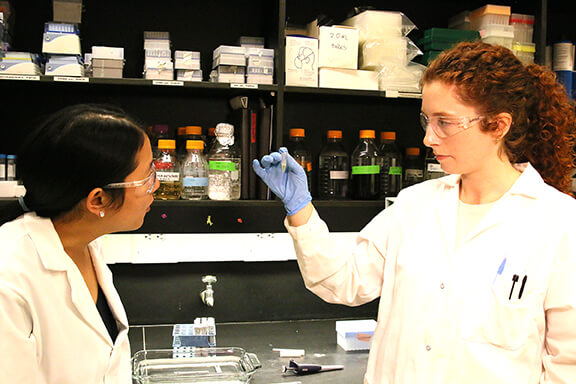September 27, 2018
Better surgery: New glue developed at Purdue could make millions of medical procedures safer, less invasive for patients
WEST LAFAYETTE, Ind. – More than 230 million invasive surgeries are performed worldwide each year – and nearly all of those procedures create additional tissue damage from stitches and staples. Researchers at Purdue University are hoping to significantly decrease that damage with a new surgical adhesive technology.
The Purdue team is working to solve one of the major challenges in the biomedical technology field – most adhesives do not work well in moist environments because water interferes with the adhesion process. That means they cannot work inside the human body.
Glue developed by the Purdue team uses a family of proteins and a modified amino acid to form a strong elastic bond between the soft tissues being joined. A YouTube video is available at https://www.youtube.com/watch?v=QgKseb6jiqU&feature=youtu.be.
“We are taking a giant leap in health care research by creating something totally new,” said Julie Liu, an associate professor of chemical engineering and biomedical engineering at Purdue, who led the research team. “There are currently no viable surgical glues that work inside the body.”
The Purdue researchers were inspired by natural glues that are created using the proteins produced by underwater organisms such as mussels and sandcastle worms.
“This research presented a whole new set of challenges for me,” Liu said. “Our team had to come up with ways to bond soft tissues within a wet environment that are non-toxic and biocompatible.”
 Purdue University associate professor Julie Liu, at left, and doctoral student Sydney Hollingshead helped create a glue that could make medical procedures safer. (Purdue University image/Erin Easterling)
Download image
Purdue University associate professor Julie Liu, at left, and doctoral student Sydney Hollingshead helped create a glue that could make medical procedures safer. (Purdue University image/Erin Easterling)
Download image
The Purdue glue has several advantages over sutures and staples, including reduced patient discomfort, lower risk of infection and less damage to surrounding healthy tissue.
The technology aligns with Purdue's "giant leaps" celebration of the university’s global advancements made in health, space, artificial intelligence and sustainability as part of Purdue’s 150th anniversary. Those are the four themes of the yearlong celebration’s Ideas Festival, designed to showcase Purdue as an intellectual center solving real-world issues.
“It is exciting to work on such innovative and impactful research as a student,” said Sydney Hollingshead, a chemical engineering doctoral student, who assisted with the research. “We are going to help a lot of people by turning our engineering discoveries into medical advances.”
Liu also said that commercial glues sold as liquid bandages for cuts and scrapes do not work for surgeries because the chemical makeup of those glues is toxic when used inside the body.
Researchers are working with the Purdue Office of Technology Commercialization to patent the technology. They are looking for partners to license it.
About Purdue Office of Technology Commercialization
The Purdue Office of Technology Commercialization operates one of the most comprehensive technology transfer programs among leading research universities in the U.S. Services provided by this office support the economic development initiatives of Purdue University and benefit the university's academic activities. The office is managed by the Purdue Research Foundation, which received the 2016 Innovation and Economic Prosperity Universities Award for Innovation from the Association of Public and Land-grant Universities. For more information about funding and investment opportunities in startups based on a Purdue innovation, contact the Purdue Foundry at foundry@prf.org. For more information on licensing a Purdue innovation, contact the Office of Technology Commercialization at otcip@prf.org. The Purdue Research Foundation is a private, nonprofit foundation created to advance the mission of Purdue University.
Writer: Chris Adam, 765-588-3341, cladam@prf.org
Source: Julie Liu, julieliu@ecn.purdue.edu

